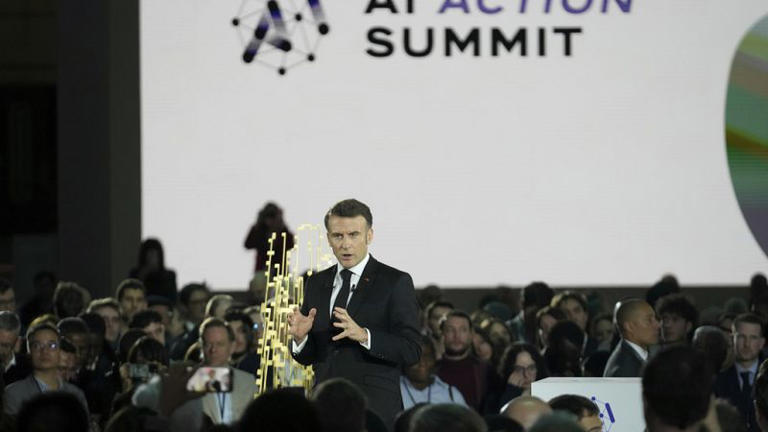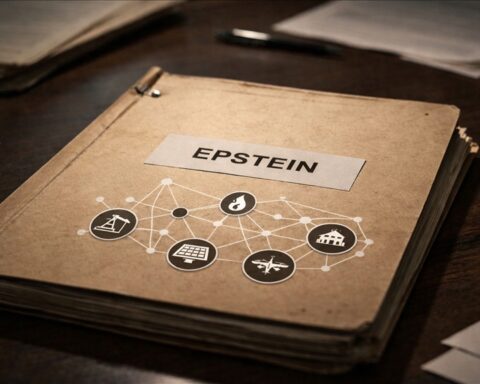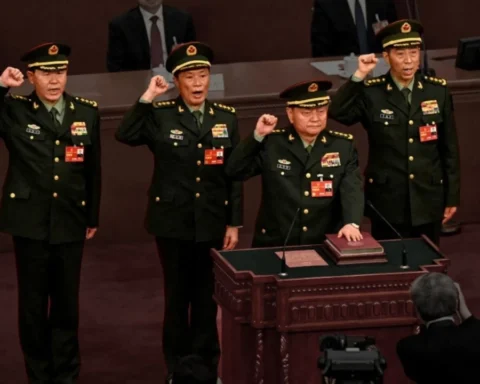The French tech world is reeling from Donald Trump’s Stargate announcement and DeepSeek’s recent breakthrough.PARIS — The conversation around the table was free-flowing but anxious.
It was mid-January, and the cream of France’s tech industry was lunching with Emmanuel Macron in the elegant Salon des Ambassadeurs at the Elysée Palace. Mistral boss Arthur Mensch, Helsing chief Antoine Bordes and billionaire entrepreneur Xavier Niel were all there. As some of the attendees struggled with the cutlery and French dining etiquette, the tech bros all had one message for the French president: The battle to become the world’s leader in artificial intelligence was raging and Europe risked losing out.
Little did they know how prescient their warning would prove.
A week later, U.S. President Donald Trump upended the tech industry with his Stargate plan, a staggering $500 billion investment in AI infrastructure.
The Jan. 21 announcement sent shockwaves through Paris and across the continent.
“It knocked everyone out … You felt suddenly a gloominess descend, with people saying we’ll never be able to raise so much money,” said Laure de Roucy-Rochegonde, an AI expert with the Paris-based IFRI think tank.
It was felt then that the U.S. was about to annihilate the competition. Even if American investors failed to raise the full $500 billion, even a fifth of that sum dwarfed anything Europe could aspire to spend.
Macron’s pet project, the AI Action Summit in Paris, was less than a month away and risked coming off like a two-bit side event. Its goals — to push for sustainability and inclusivity — now appeared almost quaint.
But by the weekend, another groundbreaking moment had whiplashed the tech world.
Chinese startup DeepSeek reported that its cutting-edge chatbot had been built at a fraction of the cost of competitors like OpenAI’s ChatGPT, sending investors scrambling and reviving hopes that the global AI race wouldn’t simply be won by whoever was willing to spend the most.
“[The U.S.] use brute force with lots of resources, graphic processing units and data centers … but the Chinese did better. In the end that’s how innovation works, first someone storms the fortress with sheer force, then someone else enters by a back door,” said Justin Vaïsse, head of the Paris Peace Forum, the nonprofit that helped organize the AI summit in Paris.
“It’s just a shame it wasn’t the Europeans who found that back door,” he added.
Europe first
Macron’s international summit, which begins Monday and will draw high-level envoys like U.S. Vice President JD Vance, India’s Narendra Modi and Ding Xuexiang, the Chinese vice-prime minister, was initially billed as an opportunity to push for more accessible AI technology.
“As often with big upheavals, we missed the turning point. That’s what happened with robotization and social networks,” said an aide to the French president, who, like others quoted in this story, was granted anonymity for protocol reasons.
The aide said that France must respond by securing “the place of France and Europe” in the new world of AI.
The late-January emotional rollercoaster preceding the summit put Paris into fight mode. Now the event is more about showcasing what Europe can do and supporting the continent’s burgeoning AI sector.
The summit has since become, in the words of one European official, “a Cannes festival” of the continent’s startups. It’s also an opportunity to get European investors to support their local AI companies, Macron said last week during a videoconference alongside the European Union’s technology sovereignty commissioner, Henna Virkkunen.
The president’s message was one of “European preference,” said a French government official. “We are not going to control what companies do, but European patriotism is at stake.”
Incentives to “buy European,” a data bank with preferential rates for local companies, and more EU grants are some of the ideas being bounced around in the French capital to save the continent’s AI industry.
But that’s just the type of initiative that will have industry veterans rolling their eyes.
“This is what France does every time there’s a new technology,” said Michael Jackson, an American tech investor who lives in Paris, noting the demise of European champions such as the Qwant search engine and Gaia-X cloud computing.
“If you’re a business like Mercedes or LVMH, you need the best provider, not one that you use just because he is local.”
A wakeup call
For Emmanuel Macron, artificial intelligence and technology on the whole have long been strategic domains.
The French president promised to create “a startup nation” when he was elected in 2017, and soon ordered an AI action plan from Fields Medal Winner Cédric Villani. Macron has also long championed Mistral, the crown jewel of the French AI industry, one of the few companies on the continent that develops the technology behind conversational chatbots.
Macron secured a win on Thursday when the United Arab Emirates agreed to spend more than €30 billion in France to build a 1 gigawatt data center in France. One of Macron’s advisers called the investment “proof of France’s attractiveness.”
In the eyes of the leader who prophesied the death of Europe, projects like the data center are crucial, as European civilization and its values that are at stake. If Europe cannot harness the power of AI, clean tech and other new technologies, Macron has argued, its languages and democratic traditions will be imperiled.
That’s especially true for AI products like ChatGPT, which are mostly trained on English-language content and are not as effective in the EU’s 23 other official languages.
“Stargate and DeepSeek are wakeup calls,” said Bruno Bonnell, head of the French public investment body France 2030. “Do we want all chatbot answers to be generated through the prism of Chinese or American cultures?”
But the French tech community is torn over whether DeepSeek’s breakthrough validates the more open and cheaper approach taken by Mistral — or whether the Chinese startup has put its French competitor out of business.
With the urgency comes a greater focus on the current bugbear of business leaders: EU regulation, with speculation rising in Paris that the French president may call for a pause in regulation just as the AI Act is being rolled out. Europe last year introduced the world’s first legislation to regulate AI, banning certain practices and introducing shared safeguards for high-risk applications.
“The president says that Europe will only be respected if we reach the frontiers of innovation … on legislation, maybe we have gone too far, created a disincentivizing environment, maybe there are negative effects we should explore,” Vaïsse said.
Trump, meanwhile, has just ripped up U.S. AI rules agreed by the previous administration and seems unlikely to agree to any future push for global AI regulation. On both sides of the Atlantic, tech companies have lobbied against rules that could hold them back.
The future of AI
In a sign of the new dog-eat-dog world, French officials have downplayed expectations of reaching an agreement on an international declaration for “a sustainable and inclusive AI.”
China and the United States are still wrangling over the language of the declaration, said another aide to the president. “There’s a reset in the U.S. … and we are very comfortable with this,” the aide said, adding that the declaration still shows “a collective effort,” even if not everyone signs it.
French efforts are now mostly focused on getting its neighbors on the same page. European Commission President Ursula von der Leyen, who will attend the summit, is hoping that the wider use of AI can help unlock innovation and growth for the region’s sluggish economy. She may announce more details on a European AI plan at the event.
With the pace of AI development speeding up, the future of the European industry will likely become clear sooner rather than later. The tech investor Jackson sees prospects for Europe in specialized AI as opposed to core generative AI, the technology behind the chatbots, which need the massive investments available in the U.S. or China.
But that would be settling for less, and would mean depending on technology controlled by a foe, or at best an erratic friend.
Océane Herrero contributed to this report.
Kaynak: https://www.politico.eu/article/the-15-days-that-upended-emmanuel-macron-vision-for-european-ai/






